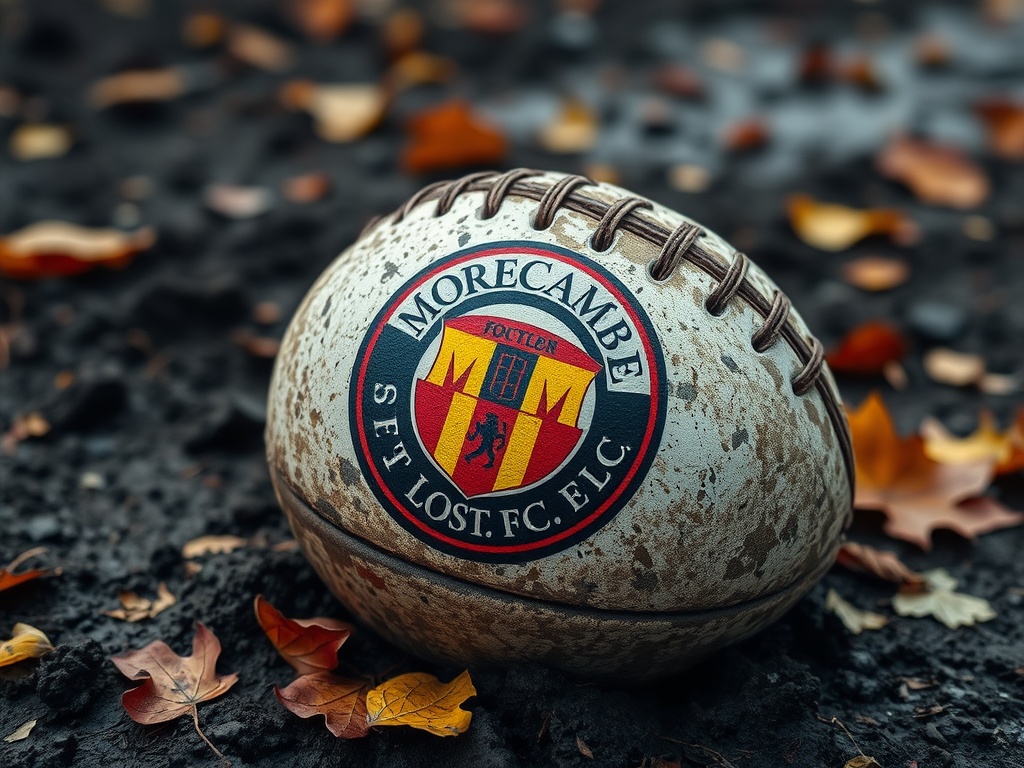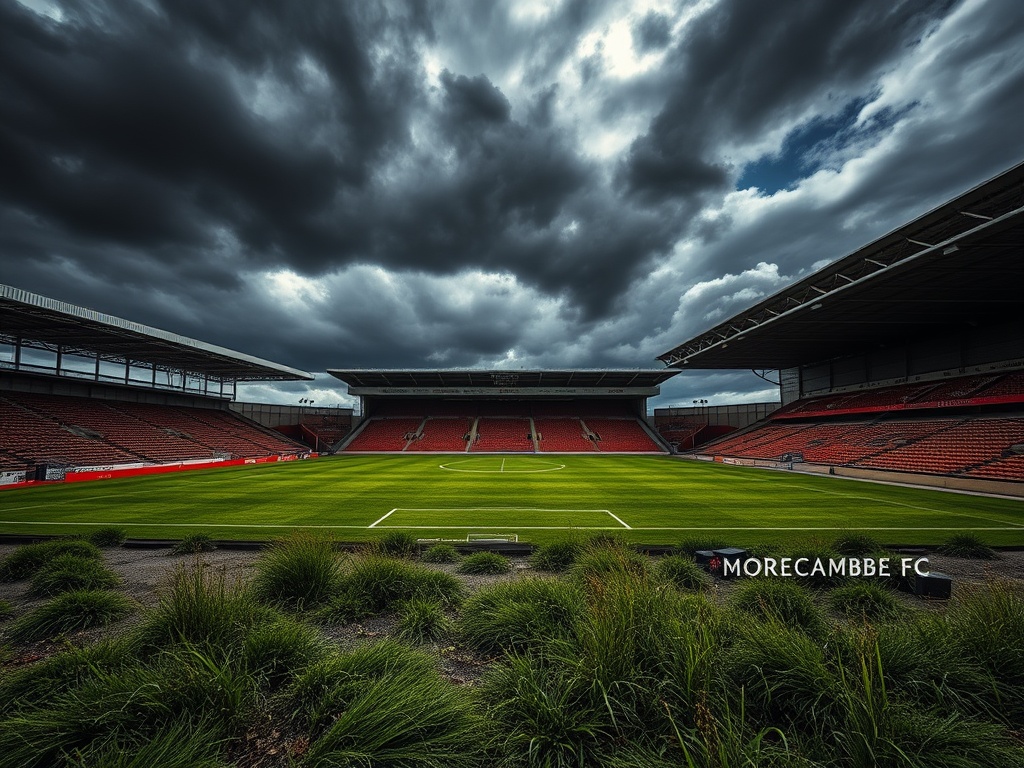Doing the 92 is Daniel Storey’s ambitious journey to visit every English football league club within a single season. To keep up with his adventure, subscribing is the best way to follow his progress.
In a recent interview with BBC Radio Lancashire, the owner of Morecambe FC, Jason Whittingham, was posed a poignant question about his hopes of leaving the club by the end of February. His response was clear and heartfelt: “With every fibre in my body.” This sentiment reveals a rare consensus among supporters, board members, and the owner himself—everyone is yearning for change. The unfortunate reality, however, is that the wait continues, and with it, the club faces an existential crisis. In less than four years since celebrating the pinnacle of their history, Morecambe is now teetering on the brink of collapse, finding themselves in a precarious 91st position in the Football League and at risk of finishing even lower. If relegation occurs, the future becomes uncertain, especially for clubs of Morecambe’s stature, which have seen more prominent teams flounder after falling from grace.
The decline of Morecambe FC is nothing short of astonishing. Just three years ago, they managed to secure a league draw against Ipswich Town while competing in the third tier, under the guidance of the inspiring Derek Adams. Now, Adams has returned, and he remains the club’s last glimmer of hope.
Read Next
- Doing the 92
- The legacy of ‘Black Arsenal’ – and a generation following in their footsteps
Morecambe is not conventionally regarded as a football hotbed. Instead, it is a charming seaside town that has managed to sidestep much of the decline experienced by similar towns across England’s coasts. This success can be attributed to a strategic focus on attracting an older demographic rather than families or younger individuals. The town boasts a well-kept promenade and quaint cafes serving up delightful cakes and steaming cups of tea. It’s the kind of place where one might expect to find a display case filled with porcelain animals and decorative plates, and indeed, such expectations are rarely disappointed. Consequently, Morecambe FC has never been a powerhouse. It took until 1995 for them to escape the Northern Premier League, and another 12 years to reach the Football League. As such, it’s easy for supporters of Premier League teams to dismiss their plight. However, this narrative deserves attention; the strength of a league is inherently tied to its weakest member, and few clubs are as fragile as Morecambe. Once a symbol of overachievement, they now embody the harsh reality of disappointment.
Surprisingly, Morecambe still clings to a chance of survival. Following the departure of manager Ged Brannan to Accrington’s assistant role, the club faced a mass exodus as 16 players saw their contracts expire; 12 of them left without new offers, while the remaining four rejected contracts. This left Morecambe with a mere five players under contract. The team endured a harrowing start to the season, losing their first five matches by a single goal and managing only seven points from their first 14 league games. The only silver lining is that they are not alone in their crisis.
This tumultuous journey began in 2018 when the Bond Group, led by Whittingham and Colin Goldring, took ownership. The following year, the duo also acquired Worcester Warriors rugby club, which was dissolved in February 2023. For Morecambe’s devoted supporters, these developments are difficult to overlook.
Morecambe 0-1 Doncaster Rovers (Tuesday 18 February)

- Game no.: 69/92
- Miles: 288
- Cumulative miles: 12,377
- Total goals seen: 204
- The one thing I’ll remember in May: Doing The 92 and battling the flu. If I struggle to reach more games between now and May, it will be a dire situation indeed.
Initially, Whittingham’s plan was to own Morecambe FC for a couple of years, a timeline likely extended by Adams’ remarkable feat of guiding the team into the third tier on a shoestring budget. By September 2022, with Worcester Warriors entering administration, Morecambe was put up for sale, and Goldring and Whittingham resigned from the board of directors. What followed were months of turmoil. Speculation surrounded potential buyers, including Sarbjot Johal, a self-identified soft drinks mogul with dubious financial claims. Tyson Fury even publicly stated he had been offered his local football team.
As relationships soured, the team’s performance deteriorated. May 2023 marked a historic low for Morecambe, as they were relegated for the first time ever. Later that year, the board accused Whittingham of imposing an unrealistic valuation on the club, stating that a Middle Eastern buyer he claimed was interested had offered “no tangible evidence or introduction” to be considered credible.
Simultaneously, the financial situation deteriorated. Last season, Morecambe faced a three-point deduction due to Whittingham’s failure to maintain the required emergency deposit account balance. Players and staff received late wage payments, which Whittingham defended by stating that they were at least paid within the same month. Further complications arose when a suspended points deduction loomed due to repeated failures to report non-payments to HMRC.
These circumstances paint a picture of a club in disarray, a notion echoed by former captain Farrend Rawson when he declined an offer to remain with the team. “Being honest, I think it’s a shambles,” Rawson stated to the BBC. “I’ve been at this club for two years, and I don’t think we’ve gone through a six-month period without some sort of issue arising. It’s disheartening for the players and staff, who have invested so much effort to achieve something special, only to see it undermined by those at the top.”
Rawson’s message was clear: if the heart isn’t in it and it no longer makes sense, it’s better to let go. History shows how good clubs with strong fanbases can suffer when poor decisions are made at the top. No news, as they say, is often bad news. Supporters and Rawson alike believe that the club should have been sold by now; the absence of communication is the most painful part. Frustration mounts over the repeated failed bids, and there is no justification for the silence, raising suspicions about the legitimacy of potential buyers. This situation has long surpassed the point of no return.
Morecambe’s Supporters’ Trust has rallied the community, organizing protests where black balloons were released, and fans turned their backs to the pitch. At every game I attended this season, chants urging the owner to depart echoed through the stands. In November, the Supporters’ Trust and the protest group 1920 Union coordinated a march through the town before a match. Manager Adams emphasized the urgency of securing a takeover to prevent the community asset from being dismantled.
Among the latest potential buyers is businessman Kuljeet Singh Momi, who has reportedly agreed on a price with Whittingham and initiated the EFL approval process. In November, Momi distanced himself from Johal and accused him of creating companies in Momi’s name. He outlined intentions to reconnect supporters with the club and ensure proper financing. However, three months have passed, and at the time of writing, the necessary EFL approvals have not yet materialized, leaving Morecambe FC in the hands of an owner who wishes to part ways, a sentiment that is reciprocated.
The longer this stalemate persists, the more dire the situation becomes. Whittingham asserts that Morecambe will continue to play football next season and that the club retains value even if relegated to the National League, but such statements only underline the decay that has taken hold during this agonizing wait. It should not be necessary for an owner to reassure that the club will survive.
Despite the grim reality outside the stadium, the resilience of Morecambe supporters is evident in the atmosphere at the Mazuma Stadium, which is far more positive than one might expect. I arrive on the 900th day since the club was put up for sale; there won’t be any celebratory festivities. However, amidst the palpable gloom, the supporters remain upbeat when the match kicks off, recognizing that the players are doing their utmost in challenging conditions. They understand that Adams previously achieved the miraculous for them, and they express the sentiment often heard at struggling clubs: support the team, not the regime. There is a camaraderie in the Main Stand suites that is simply explained: “We’re all in this together, so keep your spirits high.”
Yet beneath this thin veneer of positivity lies a harsher truth. “It has been heartbreaking to witness the gradual unraveling of all the incredible work that had been done to elevate the club,” shares Tom, a season ticket holder I speak with before the match. “The fan base surged to over 4,300 during our time in League One, compared to just 2,200 before our promotion—largely thanks to larger away followings. While the support remains united and relatively hopeful, the toll of recent years has taken its toll. The drive to invest hard-earned money and time into a club brought down by one individual is certainly waning.”
At struggling football clubs, particularly those in lower leagues and provincial towns that exist within their own realities, two uncomfortable truths often emerge from the fog. The first is the overwhelming sense of waste. It becomes a tangible monument to intangible emotions—fear, passion, uncertainty, concern, hopelessness, and anger—rooted in the understanding that something once good has been irreparably tainted. Morecambe achieved the impossible, bringing immense pride to their supporters, yet all that goodwill now feels lost. Even if the club returns to its starting point, the bitterness of that loss is compounded by the memories of what once was. The adage that it’s better to have loved and lost does not always resonate in this context.
This leads to the second undeniable truth: circumstances can always deteriorate further. There is no safety net to halt the descent, regardless of how painful the fall may be. Through periods of hardship, football clubs often suffer irreversible losses: people depart, trust erodes, and the potential to reclaim former glory slips away. It took Morecambe 87 years to achieve Football League status—something they never took for granted. This was a club that served its community simply by being there for them week after week.
Unless there are significant changes in results, ownership, and morale in the near future, these may be the last weeks Morecambe FC spends as a league club for an extended period, and the ramifications of such a shift are uncertain. The very notion of permanence is thrown into question. This is the profound tragedy: the time, effort, and dedication invested over decades can be dismantled in mere months by individuals who lack the passion shared by those who watch helplessly from the sidelines.
Daniel Storey has set himself the challenge of visiting all 92 grounds across the Premier League and EFL this season. You can follow his journey through our interactive map and explore every article he has penned thus far.
